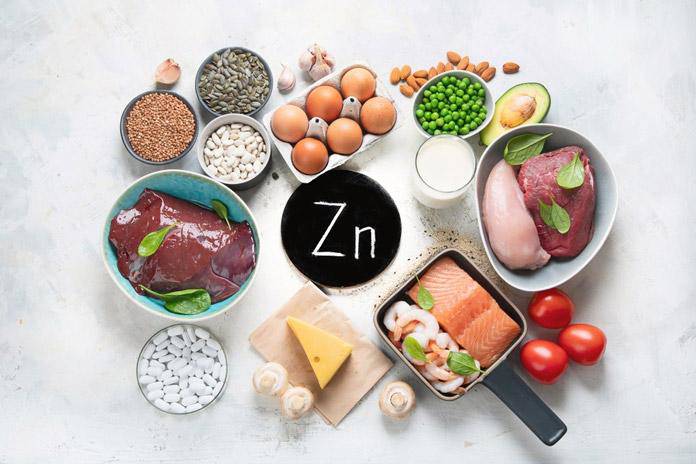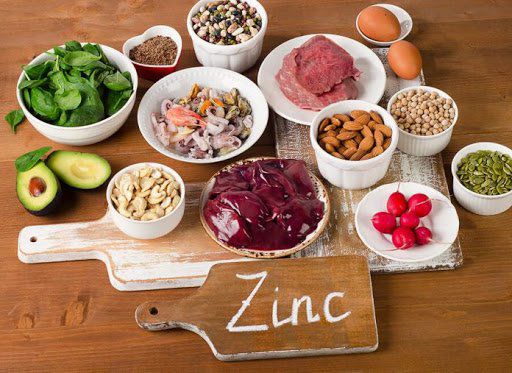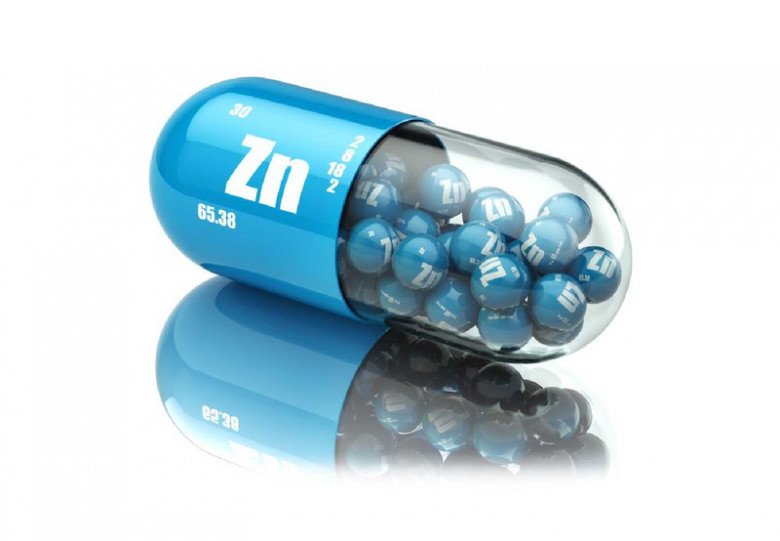Zinc is a nutrient that plays many important roles in your body. The body doesn’t produce zinc naturally, so you need to get it through food or supplements.
Zinc is an essential nutrient. Zinc is the second most abundant trace mineral in the body after iron, and is present in every cell. Zinc is required for many processes in the body, including: gene expression, enzymatic reactions, immune function, protein synthesis, DNA synthesis, wound healing, growth and development.
Zinc is found naturally in many plant and animal foods. You can also take a zinc supplement or a multi-nutrient supplement that provides zinc.
Zinc effect
1. Strengthens the Immune System
Zinc helps keep the immune system healthy as it is needed for immune cell function and cell signaling. Lack of zinc in the body can lead to a weakened immune response. The addition of zinc helps stimulate specific immune cells and reduces oxidative stress.
A review of 7 studies showed that a daily intake of 80-92 mg of zinc can reduce the duration of the common cold by up to 33%.
In addition, zinc supplementation significantly reduces the risk of infection and enhances the immune response in older adults.
2. Accelerate wound healing
Zinc is commonly used in hospitals as a treatment for burns, some boils, and other skin wounds. That’s because this mineral plays an important role in collagen synthesis, immune function, and inflammatory responses.
Our skin contains relatively high amounts of zinc, about 5% of the body’s zinc content. Zinc deficiency can slow wound healing.
In a 12-week study in 60 people with diabetic foot ulcers, those treated with 200 mg of zinc daily experienced a significant reduction in ulcer size compared to the placebo group.
3. Reducing the risk of certain age-related diseases
Zinc can significantly reduce the risk of age-related diseases, such as pneumonia, infections, and age-related macular degeneration (AMD).
Zinc has the ability to reduce oxidative stress and enhance immune response by promoting the activity of T cells and natural killer cells, which help protect your body from infection.
Zinc supplementation in older adults improves response to the flu vaccine, reduces the risk of pneumonia, and improves mental performance. A daily supplement of 45 mg of zinc can reduce infection rates by up to 66% in older adults.
Additionally, in a large study of more than 4,200 people, daily intake of antioxidant supplements – vitamin E, vitamin C and beta-carotene – plus 80 mg of zinc reduced vision loss and significantly reduced the risk of age-related macular degeneration (AMD).
4. Support acne treatment
Acne is a common dermatological disease, estimated to affect 9.4% of the global population. Acne is caused by blockage of oil-producing glands, bacteria, and inflammation.
Studies show that topical and oral zinc treatments can effectively treat acne by reducing inflammation, inhibiting the growth of P. acnes bacteria, and blocking sebum gland activity.
5. Reduce inflammation
Zinc reduces oxidative stress and lowers levels of certain inflammatory proteins in the body. Oxidative stress causes chronic inflammation, a contributing factor to various chronic diseases, such as heart disease, cancer, and mental decline.
In a study in 40 older adults, those who took 45 mg of zinc per day had more reductions in inflammatory markers than the placebo group.

Symptoms of Zinc Deficiency
Although severe zinc deficiency is rare, it can occur in people with rare genetic mutations, nursing infants whose mothers don’t have enough zinc, people who drink alcohol, and those who take certain medications, immunosuppressive drugs.
Symptoms of severe zinc deficiency include impaired growth and development, delayed sexual maturation, skin rashes, chronic diarrhea, difficulty healing wounds, and behavioral problems.
Symptoms of mild zinc deficiency include diarrhea, decreased immunity, thinning hair, decreased appetite, mood disorders, dry skin, fertility problems, and difficulty healing wounds.
People at risk for zinc deficiency include:
– People with gastrointestinal diseases such as Crohn’s disease
– Vegetarians and vegans
– Pregnant and lactating women
– Older children are exclusively breastfed
– People with sickle cell anemia
– People who are malnourished
– People with chronic kidney disease
– People who abuse alcohol.
Zinc rich food
Here are the foods that contain the most zinc:
– Shellfish: Oysters, crab, clams, lobster…
– Meat: Beef, pork, lamb…
– Poultry
– Types of fish: Salmon, sardines, mackerel, halibut…
– Legumes: Chickpeas, lentils, kidney beans, black beans…

– Nuts: Pumpkin seeds, cashews, flaxseeds…
– Dairy products: Fresh milk, yogurt, cheese…
– Egg
– Whole grains: Oats, quinoa, brown rice…
– Some vegetables: Mushrooms, kale, peas, asparagus, beet greens…
When should zinc be consumed?
The best time to consume zinc during the day is 30-60 minutes before eating or 2 hours after eating and should be consumed in the morning, because consuming zinc at night will be difficult to absorb nutrients in the body.
Taking zinc on an empty stomach can cause indigestion, so it is not recommended to take zinc on an empty stomach. In addition, people with stomach pain should take zinc with meals. In addition, you can combine foods rich in vitamin C, phosphorus, vitamin A… to help increase the body’s ability to absorb zinc.
Women who are breastfeeding or taking iron should not take extra zinc, because when taking iron, the body will not be able to absorb the zinc. If you suffer from digestive ailments, you must treat the disease before adding zinc to your body to produce the desired effect.
The dose of zinc required for each subject was as follows:
– Infants aged 0-6 months: 2mg/day.
– Children aged 7-12 months: 3mg/day.
– Children 1-3 years: 3 mg / day.
– Children aged 4-8 years: 5 mg/day.
– Children 9-13 years: 8mg/day.
– Children 14-18 years: 9mg -11mg/day.
– Pregnant women: 11-12 mg/day.
– Women who are breastfeeding: 12-13mg/day.
Adult women: 8 mg/day.
Adult men: 11 mg/day.
at Blogtuan.info – Source: Eva.vn – Read the original article here





